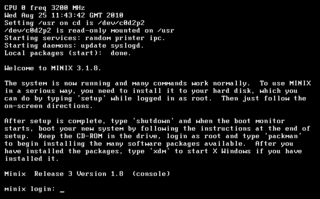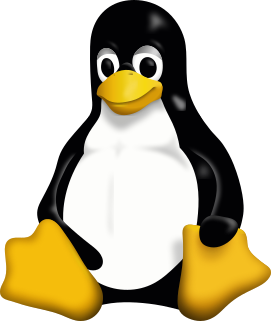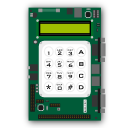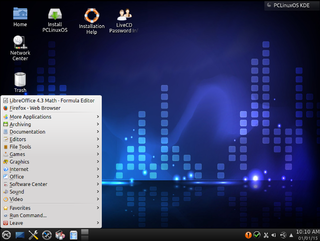
Free software or libre software is computer software distributed under terms that allow users to run the software for any purpose as well as to study, change, and distribute it and any adapted versions. Free software is a matter of liberty, not price: users—individually or in cooperation with computer programmers—are free to do what they want with their copies of a free software regardless of how much is paid to obtain the program. Computer programs are deemed free insofar as they give users ultimate control over the first, thereby allowing them to control what their devices are programmed to do.

MINIX is a POSIX-compliant, Unix-like operating system based on a microkernel architecture.

An operating system (OS) is system software that manages computer hardware and software resources and provides common services for computer programs.
The FreeBSD Documentation License is the license that covers most of the documentation for the FreeBSD operating system.

A live CD is a complete bootable computer installation including operating system which runs directly from a CD-ROM or similar storage device into a computer's memory, rather than loading from a hard disk drive. A Live CD allows users to run an operating system for any purpose without installing it or making any changes to the computer's configuration. Live CDs can run on a computer without secondary storage, such as a hard disk drive, or with a corrupted hard disk drive or file system, allowing data recovery.
Simics is a full-system simulator used to run unchanged production binaries of the target hardware at high-performance speeds. Simics was originally developed by the Swedish Institute of Computer Science (SICS), and then spun off to Virtutech for commercial development in 1998. Virtutech was acquired by Intel in 2010 and Simics is now marketed through Intel's subsidiary Wind River Systems.
This is a list of operating systems specifically focused on security. General-purpose operating systems may be secure in practice, without being specifically "security-focused".
These tables provide a comparison of operating systems, of computer devices, as listing general and technical information for a number of widely used and currently available PC or handheld operating systems. The article "Usage share of operating systems" provides a broader, and more general, comparison of operating systems that includes servers, mainframes and supercomputers.
Free/open-source software – the source availability model used by free and open-source software (FOSS) – and closed source are two approaches to the distribution of software.
Jiangsu Lemote Tech Co., Ltd or Lemote is a computer company established as a joint venture between the Jiangsu Menglan Group and the Chinese Institute of Computing Technology, involved in computer hardware and software products, services, and projects.
PulseAudio is a network-capable sound server program distributed via the freedesktop.org project. It runs mainly on Linux, various BSD distributions such as FreeBSD and OpenBSD, macOS, as well as Illumos distributions and the Solaris operating system. Microsoft Windows was previously supported via the MinGW toolchain. The Windows port has not been updated since 2011, however.
A proprietary device driver is a closed-source device driver published only in binary code. In the context of free and open-source software, a closed-source device driver is referred to as a blob or binary blob. The term usually refers to a closed-source kernel module loaded into the kernel of an open-source operating system, and is sometimes also applied to code running outside the kernel, such as system firmware images, microcode updates, or userland programs. The term blob was first used in database management systems to describe a collection of binary data stored as a single entity.

Linux is a family of free and open-source software operating systems based on the Linux kernel, an operating system kernel first released on September 17, 1991 by Linus Torvalds. Linux is typically packaged in a Linux distribution.

FreeBSD is a free and open-source Unix-like operating system descended from the Berkeley Software Distribution (BSD), which was based on Research Unix. The first version of FreeBSD was released in 1993. In 2005, FreeBSD was the most popular open-source BSD operating system, accounting for more than three-quarters of all installed BSD systems.
GNU variants are operating systems based upon the GNU operating system. According to the GNU project and others, these also include most operating systems using the Linux kernel and a few others using BSD-based kernels.
BSD licenses are a family of permissive free software licenses, imposing minimal restrictions on the use and distribution of covered software. This is in contrast to copyleft licenses, which have share-alike requirements. The original BSD license was used for its namesake, the Berkeley Software Distribution (BSD), a Unix-like operating system. The original version has since been revised, and its descendants are referred to as modified BSD licenses.

Unix is a family of multitasking, multiuser computer operating systems that derive from the original AT&T Unix, development starting in the 1970s at the Bell Labs research center by Ken Thompson, Dennis Ritchie, and others.

FITkit is a hardware platform used for educational purposes at the Brno University of Technology in the Czech Republic.
A virtual kernel architecture is an operating system virtualisation paradigm where kernel code can be compiled to run in the user space, for example, to ease debugging of various kernel-level components, in addition to general-purpose virtualisation and compartmentalisation of system resources. It is used by DragonFly BSD in its vkernel implementation since DragonFly 1.7, having been first revealed in September 2006, and first released in the stable branch with DragonFly 1.8 in January 2007.
The long-term goal, in addition to easing kernel development, is to make it easier to support internet-connected computer clusters without compromising local security.
Similar concepts exist in other operating systems as well; in Linux, a similar virtualisation concept is known as user-mode Linux; whereas in NetBSD since the summer of 2007, it has been the initial focus of the rump kernel infrastructure.








